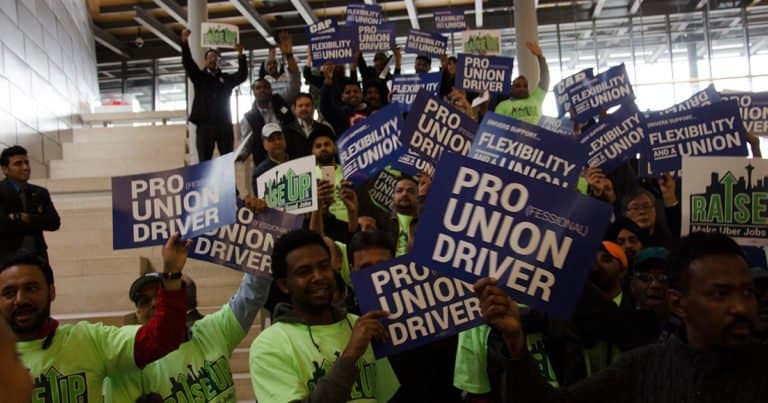
Andrew Strom is a union lawyer based in New York City. He is also an adjunct professor at Brooklyn Law School.
A couple of weeks ago, a House Education and the Workforce Subcommittee held a hearing on another bill to dismantle basic workplace protections. The bill, H.R. 3441, dishonestly labeled the “Save Local Business Act,” could more properly be titled, the “Shield Big Business Act,” or perhaps the “Leave Workers Without a Remedy Act.”
The proposal would rewrite the definition of joint employer under both the National Labor Relations Act (NLRA) and the Fair Labor Standards Act (FLSA). The bill is ostensibly a response to the NLRB’s decision in Browning-Ferris Industries of California, Inc., but it is far more radical than a mere attempt to undo Browning-Ferris. For one thing, the NLRB’s decision in Browning-Ferris had no effect on the joint employer standard under the FLSA, which has remained unchanged since the 1930s.
The press release issued by Subcommittee Chairman Bradley Byrne demonstrates the Republicans’ willingness to mislead in several ways. First, Byrne states, “As a former labor attorney, I can tell you it used to be very clear in legal terms how you become someone’s employer. But that’s no longer the case since the National Labor Relations Board stepped in.” In fact, the NLRB only changed the standard to conform to the common law standard that should have been familiar to Byrne. More importantly, nowhere in the press release is there an acknowledgement that the FLSA standard has not changed. The press release is misleading in another respect. Like some sort of Soviet-era newspaper, the press release pretended that there were only three witnesses at the hearing, ignoring the compelling testimony of Michael Rubin, the only witness the Democrats on the Committee were allowed to invite.
Rubin, a lawyer who has represented low-wage workers in wage and hour and discrimination lawsuits, submitted detailed written testimony explaining how the Republican proposal would harm workers. As Rubin explained, workers would prefer not to have to bring a joint employer claim since those claims are more complicated and more expensive to litigate. But, if a lead firm farms out work to undercapitalized contractors, joint employment claims are necessary if workers are to have any remedy for wage theft. Rubin gave the example of workers at a Wal-Mart warehouse who worked for labor services contractors. According to Rubin, the wage and hour violations were “egregious,” but the only way the workers were able to obtain a $22.7 million settlement was by making credible joint employer claims against Wal-Mart and Schneider Logistics, Inc., the warehouse operator. As typically happens at these hearings, the Republicans on the Committee refused to ask Rubin any questions, with one exception: Representative Phil Roe of Tennessee asked how much money the lawyers earned as a result of the settlement. I don’t think he is going to propose adding funding to the wage and hour division of the Department of Labor so that workers don’t need to hire private attorneys to vindicate their rights.
The witnesses invited by the Republicans were two business owners and one lawyer who represents employers. Notably missing were any workers who would suffer under the proposed bill. I’d like these hearings to be required viewing in high school social studies classes, although that might only exacerbate cynicism among young people. Representative Rick Allen of Georgia used his five minutes to demonstrate his lack of understanding about basic labor law. Veering off-topic, he asked whether in a so-called “right-to-work” state, you can have separate entrances for unionized and non-union contractors at a construction site, and whether that’s different depending upon state law. Of course, in reality there are no separate state laws regarding entrances for workers at construction sites, and what I refer to as “right-to-shirk” laws only outlaw arrangements that require workers to pay fees to a union that has been chosen by their co-workers as their exclusive bargaining representative. But Representative Allen looked like a scholar compared to Representative Glenn Grothman of Wisconsin, who used his time to ask, “Do you know why the government hates small business?”
If the hearing really was about the Republicans’ love of small business, it’s too bad that they couldn’t look past their talking points to realize that when it comes to the joint employer issue, the interests of small business and workers are aligned. Without the threat of joint employer liability, large corporations can use their economic power to shift all the risk of compliance onto smaller firms that they do business with. As large firms drive margins down further and further, the small contractors feel pressure to cut corners at the expense of workers. Too often, the result is that workers are victims of wage theft. The only hope of reducing that downward pressure on small business owners and workers is if large lead firms have some realistic fear that they will be held accountable when, for example, they pay their contractors so little that wage and hour violations are inevitable. But, that’s not a message the Republican donor class wants to hear.










Daily News & Commentary
Start your day with our roundup of the latest labor developments. See all
September 12
Zohran Mamdani calls on FIFA to end dynamic pricing for the World Cup; the San Francisco Office of Labor Standards Enforcement opens a probe into Scale AI’s labor practices; and union members organize immigration defense trainings.
September 11
California rideshare deal advances; Boeing reaches tentative agreement with union; FTC scrutinizes healthcare noncompetes.
September 10
A federal judge denies a motion by the Trump Administration to dismiss a lawsuit led by the American Federation of Government Employees against President Trump for his mass layoffs of federal workers; the Supreme Court grants a stay on a federal district court order that originally barred ICE agents from questioning and detaining individuals based on their presence at a particular location, the type of work they do, their race or ethnicity, and their accent while speaking English or Spanish; and a hospital seeks to limit OSHA's ability to cite employers for failing to halt workplace violence without a specific regulation in place.
September 9
Ninth Circuit revives Trader Joe’s lawsuit against employee union; new bill aims to make striking workers eligible for benefits; university lecturer who praised Hitler gets another chance at First Amendment claims.
September 8
DC Circuit to rule on deference to NLRB, more vaccine exemption cases, Senate considers ban on forced arbitration for age discrimination claims.
September 7
Another weak jobs report, the Trump Administration's refusal to arbitrate with federal workers, and a district court judge's order on the constitutionality of the Laken-Riley Act.